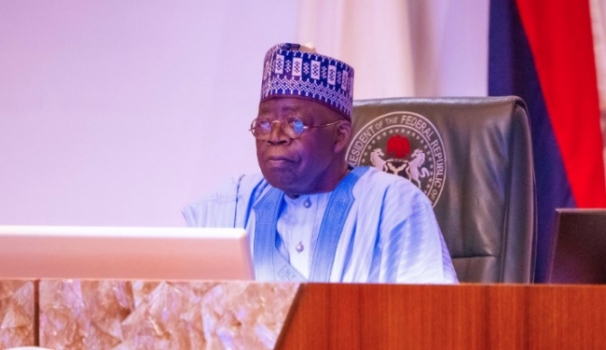By Chukwuma Umeorah
A coalition of women’s rights groups has called on President Bola Tinubu to take decisive action to dismantle the entrenched patriarchal structures in Nigerian politics, allegedly responsible for the systemic suppression of women in leadership and governance.
This call to action followed the recent suspension of the lawmaker representing Kogi Central, Natasha Akpoti-Uduaghan, by the Senate.
On March 6, she was suspended for six months, following a report by the Senate Committee on Ethics, Code of Conduct and Public Petitions, which cited allegations of misconduct and her refusal to comply with seating arrangements during the February 20 plenary session.
During a protest in Lagos, yesterday, the coalition, jointly led by Purple Women Foundation, Womanifesto, Emerge Women and Women in Governance and others marched to the Lagos State Government House to submit a letter of demands addressed to President Tinubu, urging him to intervene in what they described as an unfair political system that has continued to sideline women.
The demands included the reinstatement of Akpoti-Uduaghan, the resignation of the Senate President, Godswill Akpabio and an independent investigation into the case, among others. The groups asserted that Natasha’s suspension was not an isolated incident but a reflection of the broader structural barriers that have long marginalised women in the political space.
Founder of Purple Women Foundation, Ireti Bakare Yusuf claimed that “there exists a patriarchal structure, where it appears that those who have certain privileges refuse to share them and, in turn, use them to suppress others. In Nigeria, privilege is held tightly by men. It stops competent women from getting jobs or entering politics simply because they do not belong to the ‘right’ networks. We demand an end to that. It is harmful to everyone and society at large. We call on President Tinubu to dismantle such structures and ensure that there is a fair and inclusive political environment. Natasha’s case is only a glimpse of the broader problem in government and society.”
Yusuf added that the suspension was illegal and a plot to silence the senator and, by extension, women’s voices. She condemned restrictive political practices and cultural biases that make it difficult for women to attain and retain leadership positions. “From late-night meetings designed to exclude women to outright harassment, the system has long been tilted against female politicians,” she said.
Although the Senate had maintained that Natasha’s suspension was a disciplinary measure, Yusuf argued that it had refused to comply with a court order to reinstate her. “Such actions in Nigerian politics disproportionately affect women. We demand justice, fairness, and equity.” Beyond the senator’s case, the protesters highlighted broader issues of systemic discrimination and sexual harassment against women in governance. A representative of the Women Advocate Research & Documentation Centre (WARDC), Mary Peluola, decried the normalisation of gender-based discrimination, stating that while laws exist to protect women, enforcement remains weak.
She stressed that, “workplace harassment, gender pay gaps, and the marginalisation of women in leadership roles are consequences of a system that prioritises male dominance.”
The women groups backed Natasha’s decision to escalate the matter to the United Nations Inter-Parliamentary Union, insisting that global accountability was necessary to combat gender-based political suppression in Nigeria.
“This fight is bigger than one person; it’s about breaking the barriers that have held women back for too long,” Peluola added.

